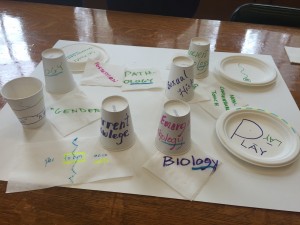The Sexual Knowledge unit brings together scholars from across the humanities, social sciences and biomedical sciences at the University of Exeter and beyond who are engaged in research about sex, gender and sexuality.
We foster collaboration with practitioners outside of academia to develop new approaches to sexual health and wellbeing. Building on the international recognition of research activities within the unit, our ambition is to consolidate the University of Exeter as a world leader in interdisciplinary, engaged and applied research on a wide range of issues around sexual knowledge.
We are committed above all to:
1) Developing new languages and practices of interdisciplinary collaboration
2) Developing world-leading research in dialogue and through collaboration with the world outside academia
3) Applying our research to address urgent challenges in the contemporary world
In collaboration with our network of partners across the South West region and beyond, we work to shape the direction of our research and to test and develop the real-world relevance and application of our findings. As such, we aim to break down barriers between academic disciplines and to collapse the distinction between the critical and the applied, research and practice. A key objective is to develop a robust model for collaboration that will enable humanities scholars, social scientists, biomedical researchers and practitioners in clinical and non-clinical settings to find new and productive ways to address jointly the various complex challenges around health and wellbeing facing the modern world.
Key questions for research within the unit include:
- How and why do we study sex, gender and sexuality?
- Who studies sex, gender and sexuality and how do they gain the authority to do so?
- What evidence is used to document sexuality (e.g. from animal – human comparisons, patient case studies, statistics and surveys, neuroscientific data, cross-cultural comparison or historical material)?
- How can we communicate with people across disciplines and forms of expertise?
- How can we use this dialogue to improve health and wellbeing?
- How have various forms of knowledge about sex evolved within different cultures and contexts?
- How do different approaches (e.g. literary, medical, anthropological or religious) secure intellectual and cultural authority about sexual knowledge?
- How do different forms of sexual knowledge inform practice (e.g. in diagnosis, therapeutic treatment, education, ethics, identity formation or law)?
- How are the disciplinary bases and boundaries of such forms of sexual knowledge variously contested?

